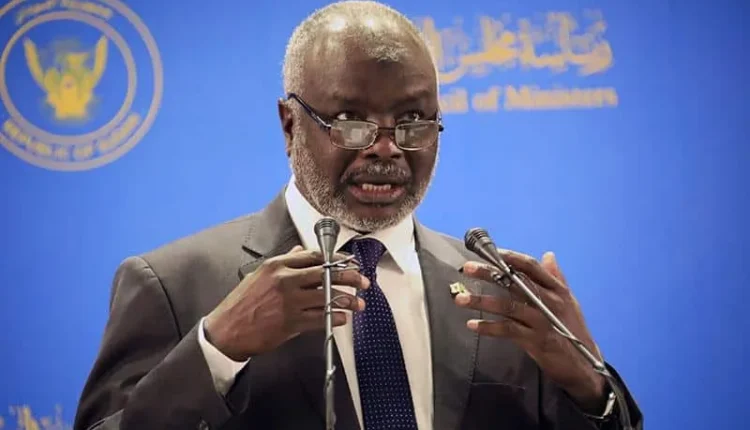With Four Years as Minister, will Jibril Ibrahim Return? And the Challenge to Deliver Fresh Results

Sudanhorizon – Nazik Shamam
A heated debate is swirling around the position of Minister of Finance and Economic Planning in the anticipated government of Kamil Idris. The source of the controversy lies in the fact that the post is allocated according to the Juba Peace Agreement, signed in 2020, which grants 25% of constitutional posts to the armed movements that signed the agreement, to remain in effect until the end of the transitional period.
On October 3, 2020, in the city of Juba, the Sudanese government, then led by Prime Minister Abdalla Hamdok and attended by Chairman of the Sovereign Council Abdel Fattah al-Burhan, signed the Juba Peace Agreement with the Sudan Revolutionary Front, a coalition comprising five main rebel groups. Chief among them are the Justice and Equality Movement (JEM) led by Dr. Jibril Ibrahim and the Sudan Liberation Movement led by Minni Arko Minnawi.
The agreement aims to achieve stability and peace in Sudan after decades of internal conflict.
The deal comprises eight protocols, with key provisions for restructuring the security and armed forces—under which members of the armed groups would be integrated into government forces after the dissolution of their militias—and the equitable distribution of wealth and economic rights.
At the heart of the agreement is the power-sharing protocol, stipulating political representation for rebel factions in the Sovereign Council during the transitional period in Sudan.
Since 2021, Dr. Jibril Ibrahim, head of JEM, has held the finance minister’s seat under the Juba Agreement—up until the government was dissolved a few weeks ago.
Stirring Controversy
With speculation mounting over the formation of Kamil Idris’ new cabinet, the finance portfolio is igniting debate on social media. Will Ibrahim retain the post under the terms of the agreement, or will he be moved elsewhere?
Last week, the Sudanese Justice and Equality Movement, led by Ibrahim, reaffirmed its full commitment to the Juba Peace Agreement, including its entitlement to ministerial posts.
Rising Disputes
Disputes have erupted between the signatories of the Juba Peace Agreement and the newly appointed Prime Minister Kamil Idris over participation mechanisms and the allocation of ministries in the government Idris is expected to form in the coming weeks.
JEM spokesperson Mohamed Zakaria Farajallah responded to reports in some media outlets regarding the stance of the peace parties:
“We affirm our unwavering commitment to the principles and entitlements of the Juba Peace Agreement, including the executive positions granted therein.”
Transitional Period
Under the October 2020 agreement, the armed movements were granted 25% of government positions, including six ministries, three seats in the Sovereign Council, and governorships in Darfur and Blue Nile, as well as several state-level positions.
In comments previously published by Sudanhorizon, Zakaria emphasized that the agreement stipulates these positions should remain with the signatory groups until the end of the transitional period.
He added: “We agreed with the government, prior to the signing, that the positions given to the peace parties would be retained until the transition concludes.”
Jibril to Stay?
The debate has reopened scrutiny of Jibril Ibrahim’s performance during his four-year tenure as Finance Minister. Informed sources within the Ministry of Finance confirmed to Sudanhorizon that Ibrahim will remain in his position in the new government and will not be reassigned.
The sources emphasized that retaining Ibrahim is crucial given the ongoing security situation in the country.
They pointed to his success in steering Sudan’s economy through wartime without total collapse—despite the presence of all the ingredients for economic failure.
Pros and Cons
Commenting on Jibril’s tenure, businessman Yasser Al-Baqir, owner of an electronics company, noted that his performance featured both positive and negative aspects.
Speaking to Sudanhorizon, Al-Baqir said one of Ibrahim’s key strengths was his persistent effort to centralize financial control and public funds, particularly through electronic collection systems and the “E-Sali” service.
He noted that Ibrahim made a significant effort to increase domestic revenue, especially in the absence of foreign aid or grants.
However, he also criticized the Minister’s pressure on commercial activities, which, according to Al-Baqir, contributed to soaring consumer prices.
Inflation Rates
He pointed out that taxes and customs duties levied on businesses have negatively impacted prices—driving up inflation, which reached 142.82% in May.
Al-Baqir described Ibrahim’s inability to control prices as his most significant shortcoming, especially amid the sharp decline in living standards during the war.
Export Sector Concerns
A source from the National Chamber of Exporters—who requested anonymity—told Sudanhorizon that prior to the war, the Finance Minister maintained contact with exporters and showed genuine concern for the export sector.
However, the source criticized the breakdown in communication during the war—precisely when the country is in dire need of foreign currency and must remove export-related hurdles in coordination with relevant authorities.
He stressed the need to revive this focus, as exports remain one of the state’s few viable sources of income amid dwindling revenues and rising expenditures.
Lack of Transparency
Economist Dr. Omar Mahjoub argues that it is difficult to assess Jibril Ibrahim’s performance during wartime. He credited Ibrahim with successfully crafting and executing a nontraditional financial strategy under military conditions—implementing austerity and emergency measures tailored to the country’s wartime needs.
In his interview with Sudanhorizon, Mahjoub stated:
“There are no definitive sources or data to prove that Jibril professionally failed in running the ministry.”
However, he added that any shortcomings lie in the lack of transparency, weak governance, and the absence of a nontraditional oversight mechanism to safeguard public funds and combat corruption.
He also pointed to administrative issues—such as delays in employee compensation—that have disrupted government operations more broadly.
Shortlink: https://sudanhorizon.com/?p=6258

